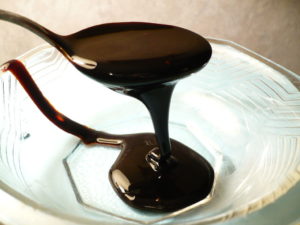Molasses, or black treacle (British, for human consumption; known as molasses otherwise), is a viscous product resulting from refining sugarcane or sugar beets into sugar.
Uses
- Used as a sweetener that is claimed to be much healthier than sugar.
Benefits
- Bone Health: This syrup contains a decent amount of calcium, which plays an important role in bone health and preventing osteoporosis.
- It is also a good source of copper, iron and selenium, all of which help maintain healthy bones
- Heart Health: Molasses is a good source of potassium, which promotes normal blood pressure and helps maintain heart health. Although this has yet to be studied in humans, rat studies have shown that supplementing with molasses can help increase HDL or “good” cholesterol. Healthy levels of HDL cholesterol may protect against heart disease and stroke.
- Blood Sugar: Molasses may also help stabilize blood sugar levels in healthy adults. One study found that eating it along with carb-containing foods resulted in lower blood sugar and insulin levels than when the foods were eaten alone. That being said, molasses scores a 55 on the glycemic index, which measures how quickly foods raise blood sugar levels. That’s not much lower than refined sugar, which is somewhere around 60. People with diabetes may want to choose a low-calorie sweetener like stevia or erythritol.
- Antioxidants: According to research, blackstrap molasses contains even more antioxidants than honey, as well as other natural sweeteners like maple syrup and agave nectar. Studies also show that the antioxidants in it can help protect cells from the oxidative stress associated with cancer and other diseases.
- Bottom Line: Molasses contains several nutrients that provide health benefits. It is also higher in antioxidants than other common sweeteners.
Cautions
n/a
Interactions
n/a
Other names
- black treacle
References
Source: Wikipedia, https://en.wikipedia.org/wiki/Molasses
MedicalNewsToday, http://www.medicalnewstoday.com/articles/318719.php

